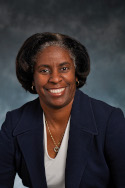Celebrating Diversity in Electrical Engineering: One Woman’s Full-Circle Journey
Once set to follow in her father’s footsteps and become a math teacher, Karen Butler-Purry, PhD, P.E., Professor of Electrical and Computer Engineering and Associate Provost and Dean of the Graduate and Professional School at Texas A&M University, was inspired to become an engineer after joining a pre-college program at Southern University and A&M College, in Baton Rouge.
“The program was such a fortunate opportunity for me,” she said. “We spent six weeks looking into each of the various types of engineering. I actually chose electrical because, at that time, I thought it was the area with the most math and would marry up my two greatest interests.”
Later in her studies, Karen came to understand that mathematics is a common denominator in all types of engineering, but by then she had “found what she enjoyed.”
An avid student, Karen went on to receive a bachelor’s degree from Southern University and A&M College in 1985, followed by a master’s in Electrical Engineering at UT Austin in 1987. She took a brief hiatus from her educational pursuits to take a position at Hughes Aircraft Company in Southern California, where she honed her coding skills in industry before returning to academia to pursue a PhD at Howard University, which she achieved in 1994. That same year, she joined the faculty at Texas A&M University in the position she still holds today ¬–effectively coming full circle with her professional aspirations.
Over the course of her studies and career, Karen had the benefit of being mentored by some of the most preeminent electrical engineers in the field, including James A. Momoh, PhD, of Howard University, as well as B. Don Russell, PhD, and Karen L. Watson, PhD, both of Texas A&M – all of whom have held prominent roles within the Institute of Electrical and Electronics Engineers (IEEE).
Karen herself has been actively involved with IEEE and the Power & Energy Society (PES) since her student days, holding membership status as a Student, Member, Senior, and Fellow.
Over the course of her student and professional careers, she has held the position of board member for the PES Editorial Board and PowerAfrica Committee, in addition to chairing the celebrated IEEE PES Awards Program and leading the PES Student Programs Committee for several years. In 2018, IEEE recognized Karen for her contributions toward expanding minority participation in power systems education.
“As a student, PES and IEEE provided such a supportive environment,” Karen said. “I had my first poster presentation and conference paper with PES as a graduate student, and when I finished my PhD, I immediately continued engaging in the Power Engineering Education Committee and ‘grew up’ there as an early faculty member through the nurturing that is available through the organization.”
Educating others about electrical engineering is one of Karen’s professional passions – but her commitment to her students goes deeper than that.
It’s my way of paying it forward,” she explained. “I benefitted from mentors along the way who helped me know the opportunities that were available to me and opened doors for me. As a professor, I didn’t just aspire to be a good teacher and researcher; I also wanted to help my students in the way I was helped.”
She continued, “I was also particularly interested in doing that for students who looked like me – African American females. I’ve had undergraduate research students every year, many of whom are from diverse backgrounds, and when I was developing my research group I very intentionally made sure it was a group that represented students who were diverse not only from a US perspective, but a world perspective as well.”
When asked about the percentages of minorities within the electrical engineering field, Karen noted that she has seen an increase over the course of her career, but the numbers are still low.
“The advances are single digit,” she explained. “When I got my PhD, there were less than five African American females that got a PhD in electrical engineering that year.
”Which is why,” she noted, “it is so important to support each and every minority student who has an interest in the field.”
“Every person is critical, and we continue to work hard to network and grow interest among the African American community across the country,” she said. “Having the foundation to succeed is critical, so one of our main focuses has been on K-12 students.”
She referred back to her pivotal experience in the Southern University and A&M College summer program, saying, “With the proper foundation, exposure, and belief that you can succeed, you can do anything. If someone wants to explore STEM courses and experiences in middle and high school, they should have the opportunity to do it. Schools should not set up artificial barriers.”
As a trailblazer among African American women within the electrical engineering and scientific community as a whole, Karen understands that she is a person young minority women can, and do, look up to.
“It certainly is quite rewarding to achieve what I have achieved, and to be a face someone can see and say, yes, she’s there, so it’s possible for me to be there, too,” she said. “There is also a part of me that is satisfied knowing that the people who invested in me can see that their efforts were worthy, because I have worked hard and given my best efforts.”


